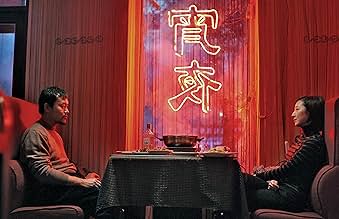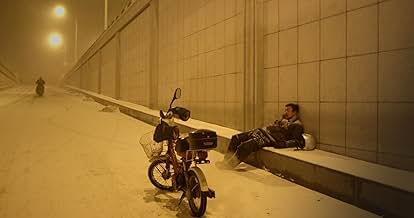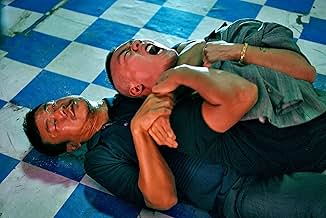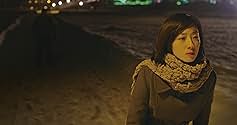VALUTAZIONE IMDb
6,7/10
10.098
LA TUA VALUTAZIONE
Un ex poliziotto e il suo ex partner decidono di proseguire le indagini su una serie di omicidi che hanno posto fine alle loro carriere e infangato il loro nome quando ricominciano omicidi i... Leggi tuttoUn ex poliziotto e il suo ex partner decidono di proseguire le indagini su una serie di omicidi che hanno posto fine alle loro carriere e infangato il loro nome quando ricominciano omicidi identici.Un ex poliziotto e il suo ex partner decidono di proseguire le indagini su una serie di omicidi che hanno posto fine alle loro carriere e infangato il loro nome quando ricominciano omicidi identici.
- Regia
- Sceneggiatura
- Star
- Premi
- 28 vittorie e 46 candidature totali
Recensioni in evidenza
There are definitely some impressive technical flourishes here. The lighting and the colors used are gorgeous, and really do highlight a lot of the film's atmosphere, which is the other good thing about it. It's able to achieve atmosphere in a rather surprising way, but it's just too bad hat that atmosphere is wasted and doesn't really highlight much. The acting is decent, but the story and the screenplay leave a lot to be desired. The characters just aren't developed all that well, and just are so, so dull. The film's sense of pacing and development are non- existent. I don't think this is anything worthwhile, although I'm sure many will like it just fine.
Funny how all these genius critical theorists here are giving thumbs down to everything but have nothing to say. Why not take my review and bust it to bits, deconstruct it, tell us how horrible it is? Come on, make your sentences pirouette for me.
In the meantime...
How does a Chinese director empty the noir sensibility of any and all of the glamour associated with its Hollywood counterpart? How does it become a study in pure dourness and grimness? If you're Yi'nan Diao, the first thing you do is set it in a place as grim and dour as a northern Chinese factory town circa 1999. In this frozen wasteland that may or may not be Harbin - it doesn't matter, it could be Siberia - the ball gets rolling when dead body parts start showing up on the conveyor belt of a coal processing plant: after all, in this time and space in China, the human body is just another physical commodity
Following a bloody shootout that leaves the two main suspects and two of his partners dead, we jump forward five years to find the surviving detective, Zhang Zili, paralyzed by the trauma, retired from the police force and passed out in the snow in an alcoholic stupor. But things are never what they seem in noir, right? So he's dragged back into the case when a former partner of his suspects the involvement of a black widow- like female at the heart of the matter. An exotic call girl? A mysterious nightclub singer? No - just some depressed woman who works at a dry cleaner's where she's regularly mauled by her piggish oaf of a boss.
The plot is unimportant, really, because the film is one big painting, a night-time world where the neon signs of the internet gambling dens and bleak taxi-dancing joints are beaten into submission by the cold dark chill of northern China, where all color and light are sucked into the film's essence, which is nothing but a black hole, a gravitational death machine that swallows up every photon in sight. At one point, while spinning around the world's most depressing ice skating rink, Zili asks his former partner, "Does anybody ever really win at life?" Of course not. Like all the other catatonic ice skaters, he's just going round and round, sometimes ahead, sometimes behind (depending on one's point of view) getting nowhere while people continue to copulate and kill and die. The key to the film is the direct translation of the Chinese title, which means "daytime fireworks." I'll let you figure that out for yourself, but if you like your noir pitch-black, this one's for you.
In the meantime...
How does a Chinese director empty the noir sensibility of any and all of the glamour associated with its Hollywood counterpart? How does it become a study in pure dourness and grimness? If you're Yi'nan Diao, the first thing you do is set it in a place as grim and dour as a northern Chinese factory town circa 1999. In this frozen wasteland that may or may not be Harbin - it doesn't matter, it could be Siberia - the ball gets rolling when dead body parts start showing up on the conveyor belt of a coal processing plant: after all, in this time and space in China, the human body is just another physical commodity
Following a bloody shootout that leaves the two main suspects and two of his partners dead, we jump forward five years to find the surviving detective, Zhang Zili, paralyzed by the trauma, retired from the police force and passed out in the snow in an alcoholic stupor. But things are never what they seem in noir, right? So he's dragged back into the case when a former partner of his suspects the involvement of a black widow- like female at the heart of the matter. An exotic call girl? A mysterious nightclub singer? No - just some depressed woman who works at a dry cleaner's where she's regularly mauled by her piggish oaf of a boss.
The plot is unimportant, really, because the film is one big painting, a night-time world where the neon signs of the internet gambling dens and bleak taxi-dancing joints are beaten into submission by the cold dark chill of northern China, where all color and light are sucked into the film's essence, which is nothing but a black hole, a gravitational death machine that swallows up every photon in sight. At one point, while spinning around the world's most depressing ice skating rink, Zili asks his former partner, "Does anybody ever really win at life?" Of course not. Like all the other catatonic ice skaters, he's just going round and round, sometimes ahead, sometimes behind (depending on one's point of view) getting nowhere while people continue to copulate and kill and die. The key to the film is the direct translation of the Chinese title, which means "daytime fireworks." I'll let you figure that out for yourself, but if you like your noir pitch-black, this one's for you.
In snow covered streets surrounded by perpetual darkness detectives and suspects are made distinguishable only by the soft glow of neon signs. Faces are shrouded by shadow, characters motives are unclear. We are in very classic noir territory in Black Coal, Thin Ice.
A brutal murder occurs in Northern China. Severed limbs appear simultaneously across the country in coal plants. The investigation into the murder is botched, leaving detective Zhang Zili injured, ashamed and without a job. Five years later, body parts are found in coal plants. Now an alcoholic and working as a security guard, Zhang once again finds himself in the pursuit of the mysterious mass murderer. The only connection between the two cases is a beautiful dry cleaning assistant Wu Zhizhen, who soon becomes the object of Zhang's obsession.
An intriguing combination of neo-noir and Chinese realism, Black Coal, Thin Ice demonstrates director Yi'nan Diao's genre literacy. From the lighting, to the troubled anti-hero, to the femme-fatale, the film is full of noir tropes. What makes the film unique is the camera's continual shift to the mundane. Unlike the modern Tarantino-inspired trend, the revelations and acts of violence are down-played. Plot takes a back seat to atmosphere as the audience is immersed in a bleak, nihilistic vision of modern China.
Winner of the Golden Bear at the Berlin film festival, Black Coal, Thin Ice has been a hit with critics but it's hard to see it winning any audience awards. The slow pace and dark, defeatist world view will be a turn off for most audience but if you don't view those as detractors, and if you are a fan of noir then this is a film to see.
A brutal murder occurs in Northern China. Severed limbs appear simultaneously across the country in coal plants. The investigation into the murder is botched, leaving detective Zhang Zili injured, ashamed and without a job. Five years later, body parts are found in coal plants. Now an alcoholic and working as a security guard, Zhang once again finds himself in the pursuit of the mysterious mass murderer. The only connection between the two cases is a beautiful dry cleaning assistant Wu Zhizhen, who soon becomes the object of Zhang's obsession.
An intriguing combination of neo-noir and Chinese realism, Black Coal, Thin Ice demonstrates director Yi'nan Diao's genre literacy. From the lighting, to the troubled anti-hero, to the femme-fatale, the film is full of noir tropes. What makes the film unique is the camera's continual shift to the mundane. Unlike the modern Tarantino-inspired trend, the revelations and acts of violence are down-played. Plot takes a back seat to atmosphere as the audience is immersed in a bleak, nihilistic vision of modern China.
Winner of the Golden Bear at the Berlin film festival, Black Coal, Thin Ice has been a hit with critics but it's hard to see it winning any audience awards. The slow pace and dark, defeatist world view will be a turn off for most audience but if you don't view those as detractors, and if you are a fan of noir then this is a film to see.
Black Coal, Thin Ice is the kind of film that can only be felt, the charming point of the film is the indescribable feeling you get from the unique atmosphere. It's a suspense film with sort of Film-Noir feeling, but the plot of the case actually is not so important. As I said, what matters is the feeling. Those empty street shots, environment background sounds, strange acts and even some dark humor tastes. It even looks like a Jia Zhangke's film sometimes.(Well, Jia Zhangke's name did appear in the thank list in the end credits.) Such feeling reached the top in the ending of the pyrotechnical in daytime, it not only reflect the title (The Chinese title is Bai ri yan huo, which means The Daylight Pyrotechnix.) but also release the depressed emotion and atmosphere. (The Uncut Version has very strange but interesting dark humor style scenes in the ending, but they are cut out in the Censored Mainland China Theatrical Version.)
The atmosphere in the film is nearly perfect, however the romance relationship between two characters is not believable at all. The whole film is based on that relationship, but it didn't convince me. Without the reliable relationship, the rest of the film seems not make sense at all. So yeah, it's a rare and unique film in Chinese cinema, it is well did in many aspects, but I don't think it is qualified for Golden Berlin Bear.
My score: 7.5 for the Uncut Version, 7.3 for the Mainland China Censored Theatrical Version.
The atmosphere in the film is nearly perfect, however the romance relationship between two characters is not believable at all. The whole film is based on that relationship, but it didn't convince me. Without the reliable relationship, the rest of the film seems not make sense at all. So yeah, it's a rare and unique film in Chinese cinema, it is well did in many aspects, but I don't think it is qualified for Golden Berlin Bear.
My score: 7.5 for the Uncut Version, 7.3 for the Mainland China Censored Theatrical Version.
The plot is that two cops who have had their careers ruined, by a case that went horribly wrong, decide to reunite. This they do after a murder that has striking similarities to the one that floored them happens again.
Zhang Zili has lost everything, his wife, the job he loved and has turned to the bottle as he goes through the motions as an underpaid security guard. Then he gets the chance to solve the case that is his nemesis. This is not a police procedural though; this has elements of the heart, base existentialism and even dark humour.
This is from director and writer Yi'nan Diao who brought us 'Night Train' and 'Uniform'. He comes from a very industrialised part of China and this is generally reflected in his films - and indeed it is here. Also the loneliness that comes from the isolating capacity of industrialised living. This though is a confident and assured piece of film making. Even when I thought a scene or two had stayed going a tad too long, he just reveals why and all of a sudden you are right back on track. In Mandarin and running to around 100 minutes this will appeal to those who appreciate modern Chinese cinema and who like a bit of dark brooding to their crime thrillers.
Zhang Zili has lost everything, his wife, the job he loved and has turned to the bottle as he goes through the motions as an underpaid security guard. Then he gets the chance to solve the case that is his nemesis. This is not a police procedural though; this has elements of the heart, base existentialism and even dark humour.
This is from director and writer Yi'nan Diao who brought us 'Night Train' and 'Uniform'. He comes from a very industrialised part of China and this is generally reflected in his films - and indeed it is here. Also the loneliness that comes from the isolating capacity of industrialised living. This though is a confident and assured piece of film making. Even when I thought a scene or two had stayed going a tad too long, he just reveals why and all of a sudden you are right back on track. In Mandarin and running to around 100 minutes this will appeal to those who appreciate modern Chinese cinema and who like a bit of dark brooding to their crime thrillers.
Lo sapevi?
- QuizThe literal translation of the Chinese title is 'Daylight Fireworks'. This is the name of the nightclub where Zhang learns a major lead, and is also echoed in the last scene.
- ConnessioniReferences Xia nu Shisan Mei (1986)
I più visti
Accedi per valutare e creare un elenco di titoli salvati per ottenere consigli personalizzati
- How long is Black Coal, Thin Ice?Powered by Alexa
Dettagli
- Data di uscita
- Paesi di origine
- Sito ufficiale
- Lingua
- Celebre anche come
- Black Coal, Thin Ice
- Luoghi delle riprese
- Aziende produttrici
- Vedi altri crediti dell’azienda su IMDbPro
Botteghino
- Lordo in tutto il mondo
- 16.830.885 USD
- Tempo di esecuzione
- 1h 50min(110 min)
- Colore
- Proporzioni
- 1.85 : 1
Contribuisci a questa pagina
Suggerisci una modifica o aggiungi i contenuti mancanti



























